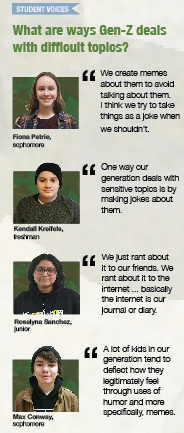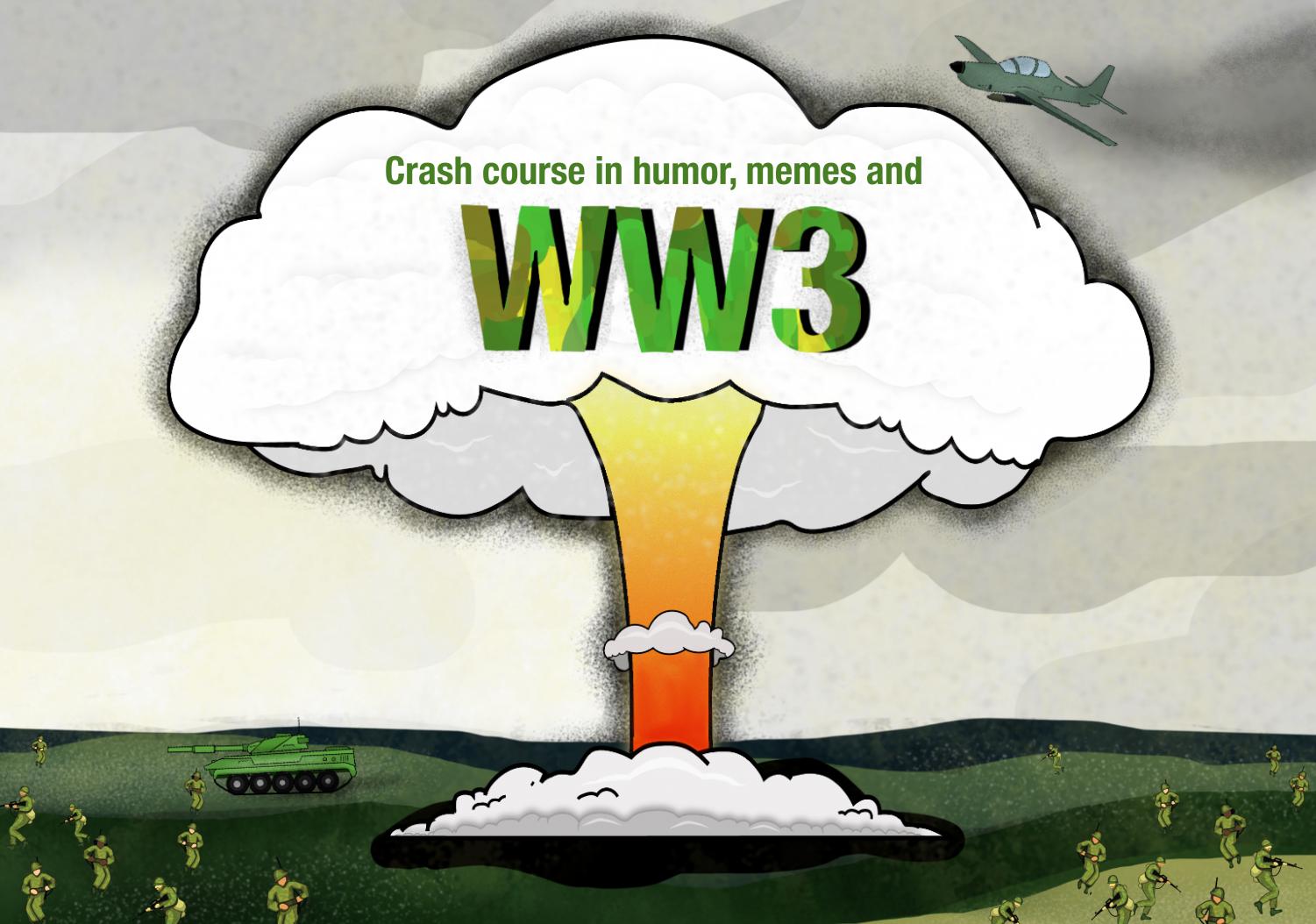Crash course in humor, memes and WWIII
Memes walk the line of being humorous or offensive
February 4, 2020
Following the recent attacks on Iran, social media was engulfed with deflection and humor, a common response from younger generations to serious events.
By Jan. 3, the term “World War III” was trending on Google and Twitter, according to Google Trends. Despite the heavy media coverage, many people didn’t originally hear the news from conventional news sites, instead the public received its information from memes.
Senior Rakesh Plantz said he felt confused by the legitimacy of information after seeing memes about the recent tension in Iran.
“When I saw my first World War III meme, I was like ‘hold up, I don’t even know anything about this,” Plantz said. “‘Are we actually fighting, am I about to be drafted?’”
Deflecting through jokes
According to psychology teacher Sarah Lindenberg, immediate reliance on humor during traumatic situations is a way for social media users to cope with serious situations.
“It can be a defense mechanism, a way of dealing with it that may not be appropriate, but it is a way that people seem to deal with situations,” Lindenberg said. “At-large, the social media culture that we have these days is just a quick flash of catching people’s attention.”
According to senior Mia Miller, she believes Gen-Z’s responses to serious events are adequate.
“It’s a good way for (our generation) to cope because that’s the way we cope, by making jokes,” Miller said.
Lindenberg said the lack of understanding of serious events is derived from social media, which particularlly affects Gen-Z.
“A product of social media is a lack of critical thinking or reading and rationalizing things that’s plaguing Gen-Z because they’ve grown up with it,” Lindenberg said.
Generational variety
According to psychologist Dan Philippe, technology and social media are the driving agents behind the growing generational differences.
“It certainly intensifies how social norms shift because you’re exposed to everything all at once and in a very intensified way,” Philippe said. “There is a very distinct dynamic that social media brings. That’s a very different experience for generations now, for younger generations.”
Lindenberg said there will always be generational differences in humor and interests.
“I would say that every generation has their own jargon and language and TV shows and media that might influence their humor, but some things seem to be consistent,” Lindenberg said.
According to Philippe, any major differences between generations are those based upon cultural norms.

“When I think about generational (differences), I am not inclined to think that it is something different about individuals in each generation, but what they are exposed to,” Philippe said. “There are differences in cultural norms, and there’s a greater acceptance of darker themes, as being acceptable to be open and to talk about.”
Lindenberg said she sees mixed responses to major events from her students, and those specific responses might be derived from what younger generations are shown on social media.
“There’s always a variety of responses within student populations, and it could be anything from discomfort to engaging with the issues,” Lindenberg said. “Being apathetic has always been the case, but with so much flashing in Gen-Z’s eyes in terms of media, it causes them to be more apathetic.”
Lindenberg said younger generations may be experiencing an overexposure to information, which inhibits their understanding of major events.
“I have a significant number of students that definitely keep up on current news and issues that are going on, but there is always a population that I try to reach that seems less empathetic or make light of certain situations that they may be less familiar with,” Lindenberg said. “I don’t know if that is a generational thing, but there may be some link to just being overloaded on information.”
How far is too far?
According to Plantz, although dark humor can be a helpful coping method, it still can be deemed as inappropriate to certain viewers.
“It can go too far and I think it can offend people. You’ve seen people in other schools, this school, being called out for doing humorous things that people didn’t find funny, and you can see people online becoming emotional about it,” Plantz said. “If people can understand that it’s a joke, it’s fine.”
Lindenberg said she believes satirical news sources are within the good side of dark humor.
“A lot of politics and social events do get processed through humor. There are a lot of satirical newspapers like ‘The Onion’ and they comment on current issues that seem to be very relevant to people,” Lindenberg said.
According to senior Zakiah Goff, as long as the majority of people think that memes and jokes are funny, then it is OK.
“It’s funny. I don’t think comedy ever goes too far. If people think it’s funny, that’s fine,” Goff said.
Miller said dark humor doesn’t bother her, but there is a line that shouldn’t be crossed.
“Usually, (dark humor) doesn’t affect me much. A lot of Gen-Z humor is dark humor. For the most part, I’m OK with it, unless it’s really discriminatory to a race or gender,” Miller said.
